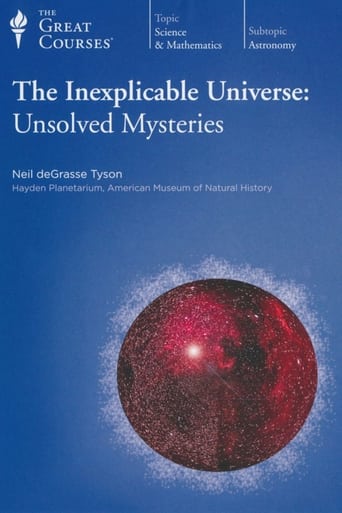The Inexplicable Universe: Unsolved Mysteries Season 1

Everything we now know about the universe from the behavior of quarks to the birth of entire galaxies has stemmed from scientists who’ve been willing to ponder the unanswerable. And with the advent of modern science, great minds have turned to testing and experimentation rather than mere thought as a way of approaching and grappling with some of the universe’s most pressing and vexing dilemmas.
Watch NowWith 30 Day Free Trial!
The Inexplicable Universe: Unsolved Mysteries
2012 / TV-PG
Everything we now know about the universe-from the behavior of quarks to the birth of entire galaxies-has stemmed from scientists who've been willing to ponder the unanswerable.
Watch Trailer
The Inexplicable Universe: Unsolved Mysteries Season 1 Full Episode Guide
Neil deGrasse Tyson discusses the merging of the theory of the small (quantum mechanics) and the theory of the large (relativity). He then considers the possibility of the multiverse and what existed before the Big Bang. He examines the mystery of the matter/antimatter asymmetry in the universe and considers whether anything can travel faster than light. He considers wormholes and discusses the long term fate of the universe.
Neil deGrasse Tyson discusses the move from classical physics to modern physics. He then examines the Pioneer Anomaly and how the Pioneer space probe is slowing faster than predicted. He discusses dark matter and how it accounts for the gravity of the universe even though we know next to nothing about it. He then examines dark energy which is the unknown force causing the expansion of the universe to accelerate. He also considers some anomalies facing quantum mechanics and the theory of the Zero-energy universe. Finally, he examines the likely collision between the Milky Way and the Andromeda galaxy.
Neil deGrasse Tyson discusses the mysteries of the periodic table. He talks about how electron shells have bearing on reactivity. He also examines the idea of whether there is an island of stability beyond element 118. He then discusses the fundamental particles that make up matter and transmit forces. He then examines string theory and the mystery of black holes.
Neil deGrasse Tyson examines the origin of life in the universe. He begins by considering some reflections by the astronomer Christiaan Huygens before discussing why life's origin is such a difficult scientific topic. He then looks at the early planet Earth and discusses why there is only one tree of life. He considers extremophiles that have the ability to live in environments that appear hostile to life and examines the theory that microscopic life may have originally come to Earth from outer space. He talks about chirality in organic molecules before discussing the question of intelligence
Neil deGrasse Tyson discusses the fundamentals of matter. He begins by looking at the discovery of the electron, proton, neutron, quark, and neutrino. He then discusses Einstein's theories of relativity and its implication for traveling near the speed of light. He also looks at the unusual implications of quantum mechanics and talks about how quantum tunneling is crucial to producing fusion in the sun. He also discusses the properties of light and the equivalence of mass and energy.
Neil deGrasse Tyson discusses the history of the scientific method. He looks at the Michelson-Morley experiment and he helped disprove the existence of the luminiferous aether. He examines how mathematics and physics were used to predict the location of the planet Neptune before it was discovered. He also examines how irregularities in the orbit of Mercury helped to establish Einstein's theory of relativity. Finally, he looks at historic models of the know universe by Ptolemy and Copernicus and discusses some of the theological ramifications of science.
Free Trial Channels
Seasons


























